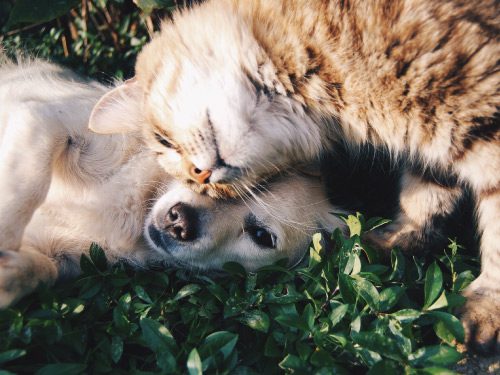
When it comes to your dog or cat, it’s not just their bad breath and yellow teeth you should be wary about. Just like humans, poor oral hygiene can lead to life-threatening issues. Our team at North Tonawanda Family Dentistry loves bringing our human patients top-quality care. We are also animal lovers, though, and we care deeply about the dental hygiene of our furry companions. Here are some ways you can keep your pet’s oral health in tip-top shape.
Professional Veterinary Check-Ups & Cleanings
It’s hard to immediately detect dental pain in your dog and cat. This could result in identifying a serious issue when the problem is at an advanced stage. To avoid this, the American Animal Hospital Association Dental Care Guidelines recommends regular examinations and dental cleanings under general anesthesia and intubation for all adult dogs and cats. They suggest having these procedures done annually beginning at one year of age for cats and small-breed dogs and two years for large-breed dogs.
Daily Brushing
Brushing your pet’s teeth every day can make a world of difference in regards to their oral health. As with humans, daily brushing helps remove plaque between teeth and slow the occurrence of dental problems. You can utilize a child’s toothbrush or wrap your finger in gauze and hold it at a 45-degree angle to the teeth. Using small, circular motions, work your way toward the tooth surfaces that touch the cheek first since that’s where most of the tartar builds up. You should avoid human toothpaste due to the unfriendly ingredients that pets shouldn’t consume. Your canine or feline companion may actually appreciate the taste of pet toothpaste, as it’s offered in flavors such as chicken and seafood!
Chew Toys
Is your dog or cat already in the habit of chomping on your shoes or your home furniture? One added benefit of providing chew toys is that your pet now has an outlet for their desire to bite on things! Give them toxin-free chew toys and this will help massage the gums and keep their teeth clean while eliminating boredom and decreasing stress levels.
Diet
Certain foods and treats can help reduce plaque and tartar. Dry foods are better than soft foods. Diets that tend to have larger kibbles may provide abrasive action against tooth surfaces, allowing a natural process of teeth cleaning. You can also assign a diet full of ingredients designed to prevent tartar mineralization. Talk with your veterinarian to see which diet is the best one for your pet.
We are all about serving our community, be it human or animal. While we may not be able to see your pet, we’re always happy to give personal recommendations if you need one. Contact us today if you have any questions or would like to schedule your own appointment.
